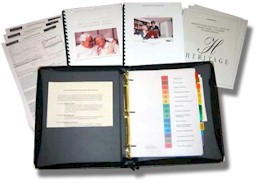What Is Probate
Probate is the court supervised process by which a decedent’s assets are transferred to his heirs, either by his Will, or if there is no Will by the statute of intestate succession. The word "probate" has its origins in the Latin "probatum" which means a "thing proved" and "probate" which means "to prove".
Assets Subject to Probate
- Personal property such as vehicles, furniture, artwork and jewelry
- Financial accounts owned individually rather than jointly with the right of survivorship or without a payable on death beneficiary
- Real estate that is owned individually rather than jointly with right of survivorship
- An ownership interest in a business whether a sole proprietorship or individually owned shares in a small company.
Assets NOT Subject to Probate
- Annuities
- Life insurance proceeds
- Retirement plan benefits from IRAs, 401(k)s or profit sharing plans
- Property jointly titled with the right of survivorship
- Assets held in a living trust
The Probate Process
 The probate process involves notifying the decedent’s heirs at law and the beneficiaries of the decedent’s Will of the existence of the Will. The notice provides them the opportunity to contest the Will in the event that the decedent did not have the requisite mental capacity or was unduly influenced by a beneficiary. The probate process also involves compiling a list of the decedent’s assets so that the assets may be distributed according to the decedent’s wishes. Finally, probate involves accounting for all of the assets in the decedent’s estate, including the payment of estate taxes, debts and expenses incurred by decedent during his life or as a result of the administration process.
The probate process involves notifying the decedent’s heirs at law and the beneficiaries of the decedent’s Will of the existence of the Will. The notice provides them the opportunity to contest the Will in the event that the decedent did not have the requisite mental capacity or was unduly influenced by a beneficiary. The probate process also involves compiling a list of the decedent’s assets so that the assets may be distributed according to the decedent’s wishes. Finally, probate involves accounting for all of the assets in the decedent’s estate, including the payment of estate taxes, debts and expenses incurred by decedent during his life or as a result of the administration process.
Probate Costs & Expenses
The financial costs of probate include attorney’s fees and court filing fees. The court filing fees are minimal in Ohio for example. However, the fees for the attorney might be significant. In Hamilton County, Ohio, an attorney who performs legal services for an estate may receive 5.5% of the first $50,000 in assets, 4.5% of the next $50,000 in assets, 3.5% of each of the next three one hundred thousand dollars and 2.5% of all assets in excess of $400,000. Additionally, attorneys may receive 1% of all assets not subject to the probate process.
 Because of the potentially large attorney’s fees, an individual can save his heirs money if he minimizes the exposure of his assets to the probate process. If an individual can avoid probate on his estate, the only significant legal work that will have to be done at death is the preparation of the state estate tax return and the federal estate tax return if the estate exceeds $11.7 million in 2021.
Because of the potentially large attorney’s fees, an individual can save his heirs money if he minimizes the exposure of his assets to the probate process. If an individual can avoid probate on his estate, the only significant legal work that will have to be done at death is the preparation of the state estate tax return and the federal estate tax return if the estate exceeds $11.7 million in 2021.
Probate records are open to the public. Therefore, the assets owned by an individual at the time of his death can be seen by members of the community. As a corollary to this, the amount of assets inherited by each of his heirs is also a public record. With more probate courts placing their records on-line, the public will be able to access the records of deceased members of the community with a few mouse clicks.
Estate Taxes
The Federal Estate Tax ('Estate Tax') and the Federal Gift Tax ('Gift Tax') are both transfer taxes. The Gift Tax taxes the amount of wealth transferred by a donor during life, while the Estate Tax taxes the amount of wealth transferred by a decedent at the time of his or her death. An overview of each tax and an explanation of how the taxes are interrelated is provided below.
Federal Estate Tax
The Estate Tax is a transfer tax, which taxes the amount of wealth transferred by a decedent at the time of his or her death. The amount of the tax owed is actually determined using a formula, which includes some technical terms defined in the Internal Revenue Code. This formula can be broken down into three parts. The first part of the formula is: Gross Estate less Liabilities and Deductions equals Taxable Estate. The second part is: Taxable Estate times Tax Rate equals Tentative Tax. The third part is Tentative Tax less Applicable Credit Amount (formerly known as the 'Unified Credit') equals Tax Payable. Each part of this formula is described below.
Gross Estate
 The first step in determining the amount of Estate Tax due is to determine the Gross Estate. The Gross Estate includes the value of all property owned by the decedent at death which passes to someone else by their Last Will and Testament or by intestacy, as well as some life insurance proceeds and some jointly-owned property. The amount of Adjusted Taxable Gifts is also included in the Gross Estate. The Adjusted Taxable Gifts are all of the taxable gifts made during the decedent's lifetime after December 31, 1976. In addition, the Gross Estate may also include some property gifted by the decedent prior to the decedent's death if the decedent retained certain controls or 'strings' over the property. Thus, the Gross Estate may include property which is not part of the decedent's 'probate estate.'
The first step in determining the amount of Estate Tax due is to determine the Gross Estate. The Gross Estate includes the value of all property owned by the decedent at death which passes to someone else by their Last Will and Testament or by intestacy, as well as some life insurance proceeds and some jointly-owned property. The amount of Adjusted Taxable Gifts is also included in the Gross Estate. The Adjusted Taxable Gifts are all of the taxable gifts made during the decedent's lifetime after December 31, 1976. In addition, the Gross Estate may also include some property gifted by the decedent prior to the decedent's death if the decedent retained certain controls or 'strings' over the property. Thus, the Gross Estate may include property which is not part of the decedent's 'probate estate.'
Deductions
The next thing that must be determined is what Deductions may be subtracted from the Gross Estate. Such Deductions may include the marital deduction, charitable deduction, and certain expenses. The decedent's Liabilities are also subtracted from the Gross Estate. After Liabilities and Deductions are subtracted from the Gross Estate, the resulting amount is known as the Taxable Estate.
Most estates don't owe federal estate or gift tax, because you can give away or leave substantial amounts of property tax-free.
The federal estate and gift taxes are really one tax, called the unified gift and estate tax. Under current law, you can leave or give away up to $11.7 million in 2021 total, before you need to pay tax. Tax liability isn't assessed until death, unless you make the total allowed in taxable gifts (very unusual) during your lifetime.
The personal estate tax exemption. The personal exemption allows a set dollar amount of property to pass tax free, no matter who inherits it. For deaths in 2021, the individual exemption is $11.7 million. The amount will be indexed for inflation, so it will probably increase in future years. If your estate is worth less than the exemption amount--as are the estates of more than 99% of the population--it won't owe federal estate tax when you die. If you have made taxable gifts during your life, the amount of your personal exemption will be reduced by the amount of those taxable gifts.
The marital deduction. All property left to a surviving spouse passes free of estate tax. (I.R.C. § 2056(a).) The marital deduction is not allowed for property left to noncitizen spouses. But the personal estate tax exemption can be used for property left to noncitizen spouses.
The charitable deduction. All property left to a tax-exempt charity is also free of estate tax. (I.R.C. § 2055(a).)
Special rules for married couples. A surviving spouse gets a big tax break. If the deceased spouse didn't use up his or her individual tax exemption, the survivor can use what's left. That gives the couple a total $23.4 million exemption in 2021, split between them in any way that provides the greatest tax benefit. For example, say a man dies and leaves $7 million to his widow; no estate tax is owed because property left to a spouse is tax-free. The widow then dies, leaving $7 million (her own $3 million plus the $4 million she inherited from her husband) to their children. Her estate won't owe any estate tax, even though the estate is over the exemption amount, because the estate can use some of the husband's unused exemption.
State estate taxes. Even if your estate isn't big enough to owe federal estate tax, the state may still take a bite. Many states collect either their own estate or inheritance taxes. (See Estate and Gift Tax FAQ.) If you live in one of those states, there's not much you can do to avoid paying those taxes, save moving to another state.
Tax Rate
Next, the Taxable Estate is multiplied by the Tax Rate. The Tax Rate is determined by the Internal Revenue Code, and can be as high as 40% in 2021. After this calculation is made, the resulting number is the Tentative Tax.
Conservatorship
 If you had a stroke or an accident that left you mentally or physically incapacitated you would need someone to manage your affairs. Sooner or later, your signature would be needed to manage a bank account, pay a bill or handle your property. Being that you are unable to do so, a court would have to get involved if you had not planned ahead.
If you had a stroke or an accident that left you mentally or physically incapacitated you would need someone to manage your affairs. Sooner or later, your signature would be needed to manage a bank account, pay a bill or handle your property. Being that you are unable to do so, a court would have to get involved if you had not planned ahead.
Typically a Conservator is appointed when a court decides that you are not competent to make a decision, or if you have an illness such as Alzheimer's disease. In this case you are physically or mentally incapable of managing your affairs.
Many people are surprised to find out that a simple Will does not keep the court from intervening into their affairs if they become incapacitated. Without planning for incapacity, you could be putting your family into a difficult situation.
Conservatorship is the process where the court gets involved in the management of the estate in the case where you are incapacitated. The reason why the court would step in is to prevent someone from taking control of your assets and misusing them. The court would make financial decisions for you and look after your welfare. Otherwise they may name a Conservator to manage your estate. The court could name your spouse, a child, a family member or an outside institution. It is their decision, not yours.
When the court gets involved your records and proceedings are open to the public. The court costs, legal bills, fees and bonds can also take away from the value of your estate. Not to mention the Conservator is required to report to the court. This is why we encourage everyone to plan ahead.
One option that many people use is a Durable Power of Attorney. A Durable Power of Attorney is an arrangement whereby one person authorizes another to take action on their behalf as his or her agent. This agent has the authority to conduct business for you.
A Durable Power of Attorney has a few downsides if used alone. Unfortunately, many banks and financial institutions have come up with their own forms of power of attorney and will not act on the basis of other powers of attorneys or will do so only after persuasion. As a result sometimes institutional forms are needed in addition to a durable power of attorney.
Another downside is the easy access a durable power of attorney will have to your records and affairs. This could open up the risk to giving someone access to your funds without accountability. Many stories have been reported of people recovering an illness only to find their assets gone.
With a "Living Trust" you can decide in advance and appoint the person who would manage your assets if you should become incapacitated. A distinct advantage a Living Trust has over just a Durable Power of Attorney is that the Trustee(s) has the legal right to manage the assets. This makes communication with banks and financial institutions a lot easier. Third parties such as banks are many times more comfortable dealing with a Trustee than they are dealing with just a Durable Power of Attorney.
When you prepare a Living Trust a power of attorney is still a good idea. Generally a financial durable power of attorney is used for assets not in the trust name such as IRA's and a health care power of attorney gives someone else the authority to make health care decisions for you in the event you are unable to make them for yourself.
Medicaid
Medicaid is the federal-state program for certain categories of low-income people that covers 36 million Americans, including children, the aged, blind, disabled, and people who are eligible to receive federally assisted income maintenance payments.
Double Taxation - Poor Planning
 Bad advice can be costly. Many legal and financial advisors have recommended "Joint Ownership" or "Joint Tenancy" as a way to eliminate Probate. While this advice is correct, in that it does avoid Probate, the aftermath of Joint Ownership can be devastating! You may find that Double Taxation will occur when you choose that method.
Bad advice can be costly. Many legal and financial advisors have recommended "Joint Ownership" or "Joint Tenancy" as a way to eliminate Probate. While this advice is correct, in that it does avoid Probate, the aftermath of Joint Ownership can be devastating! You may find that Double Taxation will occur when you choose that method.
The first tax hits when you make another person (other than your spouse) a co-owner on your property. Whether it involves real estate or financial accounts, the mere act of placing their name on an account will likely create a Gift Tax liability. The IRS says you may gift $15,000 per year to as many individuals as you want without incurring a Gift Tax liability. Above the $15,000 per individual limit, the donor is assessed from 18% to 55% on all gifts in excess of those limits, or alternatively, you will begin to use up your estate tax exemption eventually leaving you with no exemption at your death.
For example, Dad put his son, John, on the deed so that John would receive the home without Probate costs and delays at his death. The home had a current value of $151,000. That meant that John received a $75,000 gift on the day Dad put him on the deed, and that is $61,000 over the Gift Tax limit for that year! Dad's gift caused a Gift Tax of over $11,000!
This should be reported on the donor's annual tax return, but most often no one thinks of this as a taxable gift and it is neglected on the tax return. If Dad dies, the burden of the Gift Tax falls to his son with all late penalties and interest costs. Several years later the tax bill could have grown to 300%-400% more than the original tax owed.
One attorney suggested that you could simply go back and claim the gift as a part of the Unified Credit against your 2021 $11.7 million estate tax exemption. This misinformation is completely against IRS rulings. The Unified Credit must be declared in the year that it was made. The appropriate method would be for Dad to file an amended tax return and pay the Gift Tax, penalties, and interest.
In another example, it was suggested to an elderly depositor to put her daughter on her CD account in the event she became ill. The mother complied. That transaction created a $30,000 gift to her daughter. The Gift Tax limit was exceeded by $15,000, creating almost $2,000 in gift taxes. Even worse was the fact that the attorney had prepared a Will for her that named her three children equally.
At the mothers death, the daughter received her full one-third share of the estate PLUS the full $50,000 in the CD (remember that Joint Ownership avoids Probate). Since the daughter never gave any of the mother's CD (now in her name) to her brothers, this created hard feelings among the daughter and her two brothers and unfortunate discord in the family!
Joint Ownership, Debts, Lawsuits
Do you realize that any account that bears your adult child's name is a potential liability? By placing another person's name on your mortgage or bank accounts you make their problems your problems and it could mean the loss of your property!
 Any debt or judgment against that child may negatively impact the parent when property is held jointly. A creditor can get a court judgment against jointly-held property if your child loses a lawsuit or falls into serious debt.
Any debt or judgment against that child may negatively impact the parent when property is held jointly. A creditor can get a court judgment against jointly-held property if your child loses a lawsuit or falls into serious debt.
Always remember the "Deep Pocket Syndrome" which means that lawsuits always seek out a person with Wealth. If your child has nothing and you have moderate wealth, Joint Tenancy can be the perfect doorway into your bank account or real property holdings! Don't do it...it's a bad idea!
The Second Tax – Capital Gains
 The use of joint ownership causes two separate taxes at two separate times. We have discussed the Gift Tax that occurs when the second name is added to the account. But the second tax occurs when the joint owner sells the property or cashes in the account after death. The second tax is Capital Gains on profit realized.
The use of joint ownership causes two separate taxes at two separate times. We have discussed the Gift Tax that occurs when the second name is added to the account. But the second tax occurs when the joint owner sells the property or cashes in the account after death. The second tax is Capital Gains on profit realized.
Why would anyone recommend joint ownership? Yet, putting others on your deed or on your bank account is a common recommendation by legal and banking authorities as a solution for avoiding Probate. You solve one problem (Probate) by creating two tax problems. It just doesn't make sense.
In our example where Dad put his son, John, on the deed, we saw a sizable Gift Tax problem occur. Now, after Dad's death, John sells the home for a handsome profit. The problem is that John's cost basis on the home is only half of Dad's, and at least half of the profit was subject to a Capital Gains tax at 18%. His $50,000 profit caused almost $10,000 in Capital Gains tax. Few of us want to leave problems and taxes to our children, but old traditional methods like Wills and Joint Ownership can cause these heartaches and losses.
Solution - The Living Trust
 The law favors using a Living Trust, since it not only avoids Probate, but also eliminates the Gift Tax (sometimes called an Inheritance Tax). At death, all trust assets "Step-up in Basis", to equal the current market value of the asset. Therefore, at death the heirs are not forced to deal with financial losses while they are having to deal with the emotional loss of a cherished family member.
The law favors using a Living Trust, since it not only avoids Probate, but also eliminates the Gift Tax (sometimes called an Inheritance Tax). At death, all trust assets "Step-up in Basis", to equal the current market value of the asset. Therefore, at death the heirs are not forced to deal with financial losses while they are having to deal with the emotional loss of a cherished family member.
Heritage Trust has a long history of helping families protect both their assets and their families from the losses of Probate and Joint Ownership. When a Living Trust is implemented and properly funded, you have beaten the Probate system to the punch by effectively transferring your estate, during your lifetime, to your Trust. If you delay in preparing a plan like a Living Trust, the Probate Court will assume the responsibility of transferring title to your assets. It is hard to imagine that engaging courts, attorneys, appraisers, and executors for a 1 to 3 year-long process will be less expensive than a Living Trust. Yet people for some reason still believe that Wills are less expensive!
While the initial cost of preparing a Will is generally less than a Trust, dying with a Will is almost always far more expensive than dying with a properly funded Living Trust. Try asking an attorney to guarantee in writing, that the cost of Probate will only be $2,295.00 with a Will. He will refuse. The reason he won't do it is simple... he can't! A Living Trust is truly a financial decision that can save you thousands!
Currently, Federal Estate Taxes are 40%. When you calculate the size of your estate for Federal Estate Taxes, you must include all life insurance death proceeds, as well. Probate does not take life insurance into account unless the beneficiary of the policy is the person's estate.
This tax is due and payable no more than nine months after the day of death. You pay or they confiscate and sell assets to pay the tax and rarely at their true value...hence, estate sales.
Have you ever heard of an "Estate Sale"? If your Estate is over the limit and you need extra protection, an Irrevocable Insurance Trust is a good idea. An Irrevocable Insurance Trust removes your life insurance death benefits from your Estate and allows most people a very creative way to protect their Estate from the Federal Estate Tax. Bottom Line: It takes good planning to protect your assets from the largest tax of your lifetime and that's what Heritage does best.
The Downside Of A Living Trust
You have heard the positive side of The Living Trust, but many are asking, "What are the negative aspects of a Living Trust?" There are basically two negative issues that are commonly stated. First is the cost to establish a Living Trust. The second is the effort required to go through a complete transfer of assets that can take 30 to 90 days. Both of these observations are true. Generally the fees involved in drafting a Living Trust document will be double the cost of an ordinary Will. With a Will, however, you get a bonus...you get to go through Probate! You should not only count the cost to BEGIN an Estate Plan, but also include the FINAL costs to go through the settlement of your estate at death. When you add in the costs of Probate and legal representation, Gift Tax, Capital Gains Tax, and Federal Estate Taxes, the cost of the Will is universally more expensive. . . by tens of thousands!
 When the issue of the effort to establish and fund a Living Trust is brought up in comparison to a Will, the cost difference becomes staggering in favor of the Trust. The minimal time spent in preparing a Living Trust can hardly be compared to the costs, delays, complications, and legal hassles of going through Probate. The average length of time to go through Probate is well over a year, according to AARP’s Modern Maturity Magazine.
When the issue of the effort to establish and fund a Living Trust is brought up in comparison to a Will, the cost difference becomes staggering in favor of the Trust. The minimal time spent in preparing a Living Trust can hardly be compared to the costs, delays, complications, and legal hassles of going through Probate. The average length of time to go through Probate is well over a year, according to AARP’s Modern Maturity Magazine.
The only other problem that may occur is a poorly-prepared Trust. Ironically, few attorneys are adequately knowledgeable in this specialty. Most attorneys were taught to do Wills, and they make a lot more money doing them. You are encouraged to seek assistance from well-established advisors who specialize in Living Trusts.
Loss of Control
Another common question is, "Will I lose control of my assets in a Living Trust?" The answer is unequivocally, "NO!" As the Trustee of your Living Trust, you have all the same powers that you now have as the current owner of your assets. With a Living Trust you can buy, sell, or gift away assets in any fashion that you could before forming your Living Trust. In many cases, the establishment of a Trust has given you more organization and better control of your assets, since it involves an Estate Plan.
Finally, a Living Trust does NOT require any new tax forms or added tax filings. You will file and pay taxes in exactly the same manner as you did before you had a Trust. It should be noted, however, that a Living Trust provides NO liability protection or income tax benefits, nor does it give any protection against the Medicaid spend-down until 5 years after it is funded and even then the protection is weak on that point since Congress is constantly trying to close the Medicaid gap

